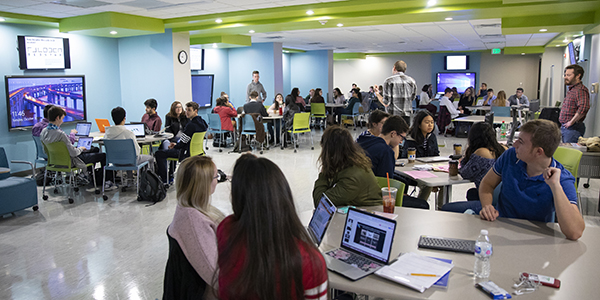Specialized training benefits young STEM researchers

The First-year Research Immersion (FRI) program at Binghamton University has proven that young college students are capable of leading real research. And according to a new study, students in FRI do better when the instructors who oversee their projects are provided extra training.
FRI is a three-semester program that allows STEM (Science, Technology, Engineering, Mathematics) students at Binghamton to use their classroom knowledge in research projects. Research educators oversee the students’ projects, while also teaching and coaching them.
“Given the national initiative to transform undergraduate science education, a key element of that is to provide at least some course-based research experience to every science and engineering major,” said Nancy Stamp, founding director of FRI.
Stamp, along with now-current director Megan Fegley, designed a professional development training program for research educators. In new articles in the journal Microbiology Letters, they described the role of research educators and how a detailed training program guided them in their novel role. The overall goal in training research educators was to make FRI students more confident and knowledgeable in research.
“We saw that research educators needed specific help, such as with developing students’ professional skills — teamwork, collaboration, public speaking,” Stamp said. “Subsequently, students reported greater learning and more benefits from the courses.”
The program consisted of training 10 research educators, all of whom were recent PhD graduates in science and engineering. Though the research educators had thorough experience with research, they did not have previous experience teaching large numbers of students.
Before the start of the semester, the research educators were brought together to learn skills in the following areas:
• Research: They learned to have realistic expectations of their students’ projects.
• Students’ Professional Development: They were trained to design assignments that allowed their students to use communication and technical skills, among others.
• Pedagogy: They learned about pedagogical methods, such as teaching science writing and rubric development, among others.
• Mentorship: They learned to be role models for their students.
Research educators met each week to share their challenges, as well as what was working for them. Through that process, they advised and motivated each other.
“Our weekly team meetings helped the research educators reflect on and describe how they have grown professionally, and the role that FRI had in that,” wrote the researchers.
By the end of the FRI program, the participating students presented their research to faculty sponsors and research faculty members. In response, the faculty members were excited to see what was coming next.
“Faculty sponsors and even other research faculty were enthusiastic about these students joining their lab groups,” wrote the researchers.
“We try to be a team and help each other,” said Caitlin Light, a research educator in FRI. “I think the way that research educators can come in and adapt to this unique teaching role is evidence of our training and supportive learning community.”
The papers, “Role of Research Educator in Sequential Course-Based Undergraduate Research Experience Program” and “Training Program for Research Educators of Sequential Course-Based Undergraduate Research Experiences,” were published in FEMS Microbiology Letters.

